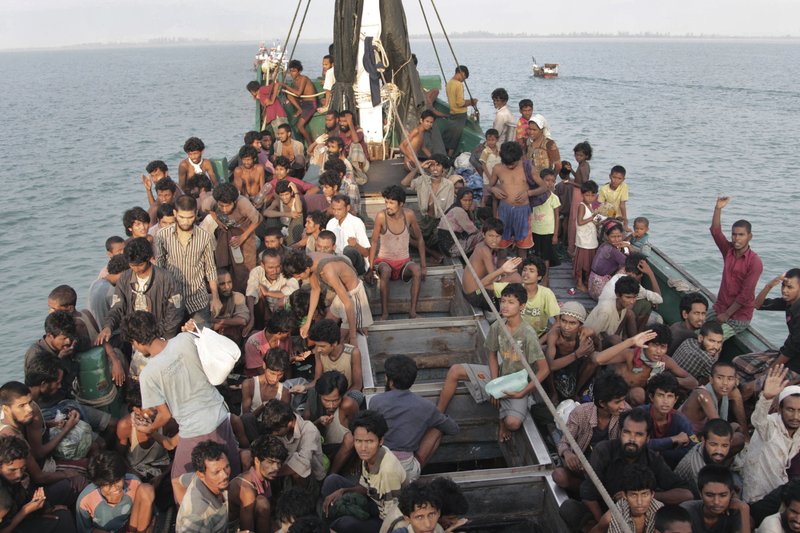BEIJING -- Malaysia has begun searching for thousands of boat people believed stranded in the Andaman Sea. From a hemisphere away in Washington, the U.S. said it will send navy planes. Even the small African nation of Gambia has offered help, saying it could take in the migrants.
The Asian region's biggest power, China, however, has remained largely silent on the crisis involving Muslim Rohingya fleeing persecution in Myanmar and Bangladeshis seeking to escape poverty.
That reflects Beijing's longstanding aversion to such foreign intervention as well as potential unease among its neighbors over any further projection of Chinese naval power, but it also complicates any aspirations Beijing may have to be a regional leader in ways that go beyond economic ties.
"China has never really come to terms with the fact that it really has to provide collective goods, including leadership on issues that do not provide any immediate financial or political return, to be deemed the regional leader," said Zachary Abuza of the Thailand-based Southeast Asia Analytics consultancy.
"Hegemony has costs, Beijing only wants the rewards," Abuza said in an email interview.
While China wants to be more active in regional crises, in the case of the Rohingya it is geographically distant, lacks experience in dealing with refugees and has yet to hear any pleas for its direct help, said Zheng Yongnian, director of the East Asian Institute at the National University of Singapore.
"It must become a pressing issue for China first," Zheng said.
Four Malaysian naval ships have begun searching for migrants believed to be stranded on crowded boats with little food, in the first official rescue operation since the boat people started washing onto Southeast Asian shores earlier this month.
The U.S. said it could offer flight patrols and is prepared to take a leading role in any multi-country effort organized by the U.N. refugee agency to resettle the most vulnerable refugees. Malaysia and Indonesia have said they would provide temporary shelter. Gambia has offered to accept them as "fellow Muslims."
While there have been no calls for China to become directly involved in the crisis, expectations have risen due to its growing involvement in U.N. peacekeeping and international relief operations, most recently sending aid to Nepal following that nation's devastating earthquakes.
China's navy has played a part in providing such assistance and has frequently transited the Andaman Sea on its way to joining anti-piracy patrols off the coast of Somalia. China hasn't yet said how one of its ships would respond if it encountered a vessel full of Rohingya in need of assistance.
With the world's second largest economy and nearly $4 trillion in foreign currency reserves, China is rapidly expanding its influence throughout Asia, investing in ports in Pakistan and Sri Lanka and pipelines in Myanmar, among a multitude of high-profile projects.
Most recently, China has attracted 57 nations from inside and outside the region to become founding members of the Asian Infrastructure Investment Bank, a potential rival to existing U.S.-backed multinational lending institutions such as the International Monetary Fund and Asian Development Bank.
"Investment and infrastructure development are far more natural entry points for Beijing to take on a leadership role," Abuza said.
That economic heft has not always been matched by political influence, however, with Southeast Asian nations wary over China's moves to assert its territorial claims in the South China Sea. India, the region's other giant, has sought to counter China's influence in its traditional backyard, while ties with Japan are hamstrung over a separate territorial dispute in the East China Sea.
The Rohingya issue isn't the best opportunity for China to exhibit leadership because it would be best dealt with by Myanmar and neighboring countries in the Association of Southeast Asian Nations, said Zhu Zhenming, professor of South East Asian Studies at Yunnan University.
"Since China is not close to the sea areas where the Rohingya are still currently stranded, China may not consider it an immediate concern to intervene in this issue to illustrate its ability in the region," he said.
China has rarely taken in refugees, partly because it has not been a favored destination for migrants since the Communist revolution of 1949, Zhu said.
Political stability and economic development have made it more attractive, however, and China is now accommodating refugees from fighting between the government and ethnic rebels in Myanmar's north. Beijing says that situation is only temporary and is anxious to see the refugees return home and peace restored to the border region.
China also has been a destination for North Koreans seeking to flee their impoverished, hard-line Communist state, although China has recognized them only as economic migrants rather than asylum seekers, in deference to its close traditional ties with Pyongyang.
China has no procedure for declaring migrants refugees, which could imply a criticism of their government back home -- something China has made a longstanding policy of avoiding.
In past decades, China also has offered refuge to Indonesians and Vietnamese of Chinese background when they faced persecution in their adopted homelands. It has also dealt with the relocation of internal migrants displaced by major infrastructure projects such as the giant Three Gorges Dam, and has sought to stem the flow of ethnic minorities such as Tibetans and Uighurs seeking to flee what they regard as oppressive Chinese policies in their western Chinese homelands.
"I don't think China will get involved in the (Rohingya crisis), based on the principle of non-interference," said Su Hao, professor of international relations at China Foreign Affairs University.
"I think China should be concerned about it, but China will not directly get involved in it. China is not in the position to take any measures at present," Su said.
Associated Press writer Ian Mader in Beijing contributed to this report.
International on 05/24/2015